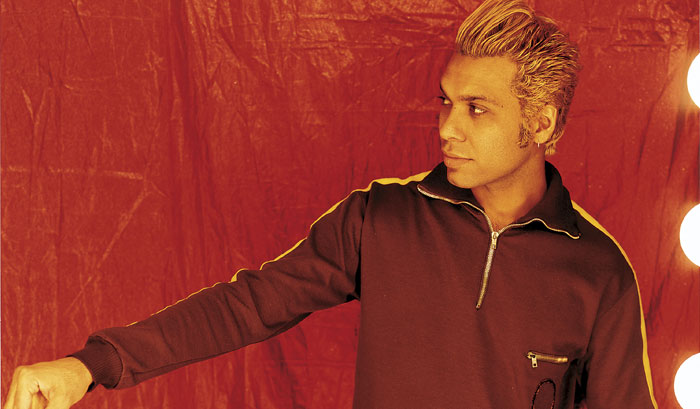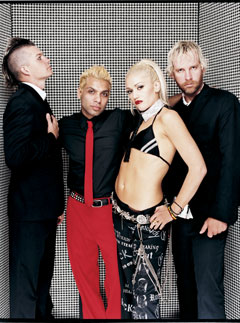


This was supposed to be No Doubt's year off.
"We'd decided to take some time apart after touring behind our last record, Rock Steady," explains band bassist Tony Kanal. "Being in a band together this long is like being married. We wanted to reenergize ourselves and get back together when we had something to say musically."

But during their so-called break, No Doubt performed at two Grammy ceremonies and the billboard Music Awards. They released Boom Box, an ambitious multimedia boxed set, and a greatest hits collection, The Singles: 1992-2003. "And those records did so well," says Kanal, "that we figured, 'why not go out on tour this summer? It'll be fun.'"
The space between the notes can be more important than the notes themselves.
Kanal was born in India and spent his childhood in Great britain before his family settled in Southern California. He's been with No Doubt since the band's 1987 inception and has co-written some of the group's biggest songs. He recently produced several songs for the soundtrack to Adam Sandler's 50 First Dates and contributed to No Doubt vocalist Gwen Stefani's upcoming solo disc. We spoke to him the night before he departed on tour.
Do you think you would have had the same passion for ska and '80s rock if you hadn't spent your early childhood in the U.K.?
I always wonder about that. I think it was just part of the environment there, the stuff that I'd see on TV on Top of the Pops. But it wasn't until we started the band that I realized how deeply the love of those two styles was embedded in me from having grown up in England.
Did you study a lot of old records as you were learning to play?
When the band started, Eric Stefani, Gwen's brother, turned me on to all that stuff. I already knew about reggae, but ska was new to me. So, at 16, I got to know the Specials, the Selecter, the English Beat, and all those bands. We all immersed ourselves in reggae and ska.
How did that shape you as a bass player?
I don't think those influences really took hold until we made Rock Steady. I'm not really happy with the reggae-influenced stuff on our previous records. A lot of it falls flat when I listen to it today. But on Rock Steady we got to work with [famed reggae rhythm section and producers] Sly & Robbie in Jamaica. we were recording "Underneath It All , " and Robbie Shakespeare told me to play in a completely different way. He made me hold back - he said I was too aggressive. He told me to play with the meat of my thumb to get a rounder attack, as opposed to playing with my fingers like I usually do. He wouldn't let me stop and do punch-ins - I had to do complete takes from the top of the song to the end. It was a cool experience.
How does reggae playing differ from rock playing?
It's all about space. When I was growing up, I was always trying to play licks. Basically, I overplayed. Sometimes that worked with what we were doing at the time. But if you really want to embrace reggae beats, it's a case of "less is more." The space between the notes can be more important than the notes themselves.
How much time do you spend getting tones in the studio?
When we made the earlier records I was obsessed with getting the perfect tone, but I've gotten less concerned with that as I've grown older. At this point, I have a basic way I like my rig to sound, and I stick with that. When we went into rehearsals two weeks ago after not playing together for a long time, my tone was exactly how I remembered it, and exactly what I wanted it to be.
How long have you been playing a Yamaha bass?
A good 15 years. My very first bass was a bolt-on neck Yamaha BB1600. I was slapping a lot back then, and that sounds much better with a bolt-on. But in '95 the neck-through BB3000 became my main bass. I wasn't slapping much anymore, and the beefier, more even sound of that bass made more sense for our music. I didn't start playing five-strings until Return to Saturn in 1998.
How do your basses differ from stock instruments?
Mainly just their colors. The one I'm using on this tour is cream-colored with a black pickguard and nickel-plated hardware. It's a cool, understated bass that reminds me of the old ska and punk days. But mainly I just want something as close as possible to the BB3000 I'm used to playing. I don't want to feel like I'm playing a different instrument.
Any hints about the next No Doubt record?
My guess is that we'll be making a very organic, rock 'n' roll kind of record. or at least we'll start there and see where it goes. To be honest, we never really plan it out - it's too hard!
























